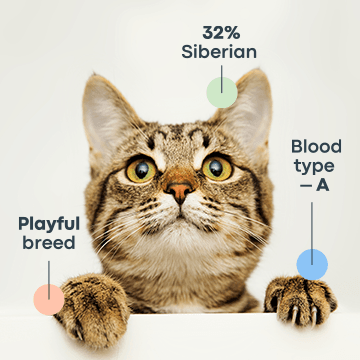Most people are familiar with the human menstrual cycle, where the uterus sheds its lining roughly every 28 days. If pregnancy occurs, the lining is retained to support the developing fetus. But what about cats? Do cats have periods? Do they menstruate?
While cats don’t menstruate in the same way humans do, they do experience an estrus cycle—commonly referred to as being “in heat.” During this phase, a female cat may have a small amount of discharge from the vulva, but she does not experience noticeable or regular bleeding.
Because going into heat can affect a cat’s behavior and health, it’s important for pet owners to understand the process. By learning how the feline reproductive cycle works, owners can better support their cats’ well-being.
Do Cats Have Periods?

No, cats do not have menstrual periods like humans. Instead, they go through a reproductive phase called the estrus cycle, during which their bodies prepare for mating and potential pregnancy. Unlike humans, cats do not shed the uterine lining; they reabsorb it instead.
Cats are induced ovulators, meaning they only ovulate (release eggs) when they mate. In contrast, humans are spontaneous ovulators—we ovulate on a regular hormonal cycle, regardless of mating.
Most female cats reach sexual maturity between four and six months of age, similar to the timing of human puberty. Their estrus cycle usually lasts between 7 and 10 days. Unlike humans, who can be fertile year-round, cats tend to go into heat seasonally—most often in late winter or early spring.
When a cat is in heat, her behavior often changes noticeably as she seeks out a mate. If she mates successfully, ovulation occurs, ending the heat cycle and beginning pregnancy, which lasts about nine weeks.
Why Don’t Cats Bleed Like Humans?
Cats don’t bleed during their estrus cycle because their reproductive systems function differently. While humans shed the uterine lining if pregnancy doesn’t occur, cats reabsorb it instead. Also, because cats only ovulate when mating takes place, there’s no need for a monthly hormonal cycle that leads to bleeding.
In short, nature has equipped cats with a more discreet and efficient reproductive process. That’s why your cat won’t leave any obvious signs—like blood—when she’s in heat, although her behavior will definitely let you know something’s up!
Human Period Vs Cat Estrus
Feature | Human Period | Cat Period |
Ovulation type | Spontaneous | Induced |
Uterine lining | Shed | Reabsorbed |
Cycle frequency | Monthly | Seasonal/polyestrous |
Bleeding/discharge | Yes | Minimal |
Behavioral issues | Varies from individual to individual | Intense (vocalization, spraying, territory marking) |
When Do Cats Get Their Period?
Female cats get their period and become sexually mature when they reach puberty at around 4-6 months. Once cats are reproductively mature, they can enter estrus, which is your cat’s menstrual cycle. From that point on, your young cat can have kittens of her own.
Signs Your Cat Is on Her Period
Loud Vocalizing

One of the most obvious signs that your cat is in heat is loud, persistent meowing or yowling. This isn’t just random noise—your cat is calling out to nearby male cats, signaling that she’s ready to mate. The vocalizations can sound dramatic, even theatrical. If you’re not planning for a litter of kittens, it’s a good idea to keep your cat indoors or your yard securely enclosed.
Scratching and Spraying

During estrus, your cat may begin marking her territory by spraying urine—a behavior that’s driven by instinct and hormones. Unfortunately, this can be messy and smelly. You may also notice increased scratching on furniture, doors, or walls. These repetitive behaviors are her way of attracting a mate. A little extra patience and understanding will go a long way during this time.
Increased Affection
A cat in heat may become unusually affectionate—even if she’s normally independent. She might rub against you constantly, follow you everywhere, or roll around on the floor seeking attention. While it can feel overwhelming, it’s just part of the cycle. Enjoy the extra snuggles while they last!
Loss of Appetite
Some cats experience a decrease in appetite while in heat. If your cat seems less interested in food than usual, it’s typically nothing to worry about and often resolves once the cycle ends. That said, always consult your veterinarian if the appetite loss is prolonged or if you have concerns.
Mating Position
During estrus, your cat may assume the mating position sometimes called the “meeting position," a classic posture that signals she is ready to mate. Your cat may lower her front half, raise her hindquarters, and move her tail to the side. This posture is a signal to male cats that she’s ready to mate. It’s often accompanied by purring, rolling, and increased affection.
Do Cats Bleed When in Heat?
Most female cats do not bleed during their heat cycle. Unlike humans, cats reabsorb their uterine lining instead of shedding it. Occasionally, you may notice tiny spots of blood on the floor or in your cat’s bedding. This is generally normal and not a cause for concern.
However, if you see blood in your cat’s urine or stool, this is not related to estrus and may signal a medical issue. In such cases, contact your veterinarian promptly for evaluation.
What to Do When My Cat Is in Heat
If you’ve never seen a cat in heat before, it can be quite jarring. Normal behaviors suddenly shift—your usually quiet, composed kitty may become loud, restless, and overly affectionate. While these behaviors are natural, they often indicate that your cat is feeling uncomfortable or even miserable. As a caring pet parent, your goal is to make this phase as manageable and soothing as possible. Fortunately, there are several strategies you can try.
Keep Your Cat Warm

Some cats find comfort in warmth during their estrus cycle. A warm, moist towel or a microwavable heat pack (wrapped in fabric and not too hot) can offer relief. You might also consider a self-warming blanket or a heated cat bed specifically designed to provide safe, gentle warmth.
Try Catnip
While some kitties are calmed by catnip during estrus, other cats are not. Offer a small amount of catnip and observe your kitty's reaction. If it helps soothe her, great! If not, no harm done. Sometimes even a distraction can be helpful during this uncomfortable time.
Keep the Litter Box Clean
Cats in heat often mark their territory to signal their availability to nearby males. Keeping the litter box fresh and clean increases the chances she’ll use it instead of choosing your couch or laundry basket. Plus, a clean litter box is always good for her hygiene and health.
Play and Engage With Your Cat
Estrus can leave cats feeling restless and frustrated. Redirecting that energy into playtime can help ease some of the stress. Interactive toys, climbing structures, and regular play sessions not only keep her mind off her discomfort but also strengthen the bond between you.
Conclusion

Considering the number of kittens languishing in shelters, the best option is to get your cat surgically sterilized (or spayed). During this routine procedure, your veterinarian will safely remove her ovaries and uterus under general anesthesia. Once spayed, your cat will no longer go into heat, sparing her the stress and frustration of unanswered biological urges.
Spaying also brings long-term health benefits. It significantly reduces the risk of mammary (breast) tumors and eliminates the possibility of uterine infections, both of which can be life-threatening.
Beyond improving your cat’s quality of life, spaying is a responsible step for any pet parent. You’ll eliminate the vocalizing, marking, and escape attempts—while gaining peace of mind knowing you’re protecting your fur baby’s health and contributing to the reduction of unwanted litters.
There are many pawsitive results to spaying—both for your cat and for you.
Frequently Asked Questions
Do cats get periods?
Not exactly. Cats don't ovulate unless they are stimulated to do so by a male cat. An estrus cycle is the feline equivalent of a human period. This is when a female cat is in heat.
Do cats bleed on their period?
Cats of reproductive age reabsorb their uterine lining rather than expelling it like humans. It's normal for your cat to spot small amounts of blood.
When do cats get their period?
A female cat reaches sexual maturity around 4-6 months of age, so it’s important to keep in mind that they can get pregnant beginning in that early stage. Getting your female cat spayed prevents pregnancy, so ask your veterinarian about the proper time to do so.
What does a cat's period look like?
Your cat’s behavior can change drastically while they are in heat. Your usually docile pet may turn into a destructive and demanding furball that you’ve never seen before! For example, you may notice increased vocalization and destructive behaviors around the house.
Get to Know Your Cat Better With Basepaws
Basepaws DNA tests help you know your cat better—both inside and out. Discover your kitty's breed profile in relation to 21 purebred breeds. Gain insight on 25 genetic traits associated with their unique appearance and behavior, as well as potentially life-saving information about their blood type and likelihood of resistance to Feline Immunodeficiency Virus (FIV).
In addition to 43 genetic diseases, Basepaws screens your cat's oral health for their current risk of having periodontal disease, halitosis, and tooth resorption. These painful issues are difficult to see, and poor oral health puts your feline friend at risk for heart, kidney, and other health conditions. Get peace of mind with Basepaws and get ahead of diseases before they're advanced—so that your cat can live a better life, even longer.





